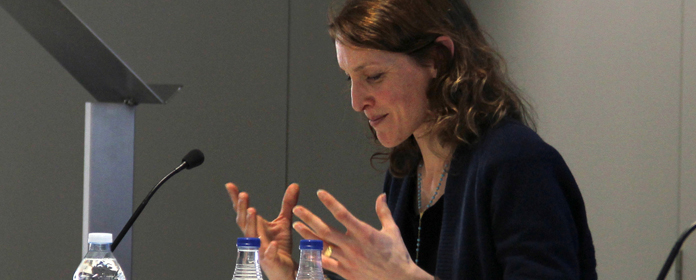Are we prisoners of our habits?
Clare Carlisle, a philosopher at King's College London, noted on Institute for Culture and Society that habits "shape our lives: how we wake up, relate to each other, or work."

PHOTO: Elena Beltrán
You get up, you wash yourself, you follow a certain path to work... We often feel trapped by daily routines and want to escape them, but do they trap our lives or make things easier? "Habits are a force that shapes our lives: how we wake up, relate to each other or work," says Claire Carlisle, a philosopher at King's College London (UK).
The expert gave a lecture seminar at the Institute for Culture and Society of the University of Navarra on 'Habits and practices', invited by the group 'Mind-brain'. In it she emphasized that these terms differentiate actions that are consolidated by repetition.
On the one hand there are the practical ones, including playing sports, playing the piano or driving. "In these cases what we want is to change ourselves: to be a good musician or sportsman..... What we want is the final result and for that we decide to repeat the action," he says. In this way, the individual action costs us and we insist because we want to develop a internship to master a skill.
On the other hand, there are habits. "The problem is that we accidentally fall into some of them, such as smoking or drinking alcohol. What we want is to smoke a cigarette or have a drink, not repeat the action," he specifies, but adds that by wanting that single action -even individually- we end up creating a habit, in this case a harmful one.
"So what starts out as a decision in the end doesn't feel like one, because when it's repeated it becomes more automatic. It's a bit of a paradox, but it's something we've all experienced," Carlisle says..
Escape from habitsDoes that mean there is no way to escape the habits? In the case of drinkers or smokers, he notes that "even if you have chosen the particular actions, you have not chosen to become addicted, but it is true that you see a responsibility." He finds the case of people who acquire a habit that they are taught more difficult: "It is more complicated to talk about responsibilities because they have not chosen to have that habit, but it is true that there is always the possibility of changing it, however much it costs".
To break habits that have become addictions, he considers it important to pay attention and be aware of the sensations and feelings produced by that habit in order to break it. "Understanding it better can weaken the strength it has," he notes.
He also offers three suggestions. The first is to develop a internship: insistently say no to that action, even if it is not what your body is asking you to do. "If you want to quit smoking, you have to insist on saying 'no' every time you feel like smoking," he recommends. Secondly, he suggests doing other actions when the need for addiction appears, such as taking a walk. And finally, he recommends avoiding certain environments in which a craving related to the addiction may arise until the addiction has been overcome -for example, shopping malls if you are a compulsive shopper-.
Technology addictionThe philosopher confirms that there is always the possibility of changing a habit, but emphasizes that it is not easy in all cases: "Sometimes it is reinforced by society and it is almost impossible to run away from it." For example, he points to the use of the Internet and cell phones; it is very complicated to ignore these technologies when they are part of society, of work and of leisure. "If a whole culture is incorporating certain habits, where do you go? How do you run away from it?" he asks.
To conclude, he insists that we should not get rid of all habits, as they are not necessarily negative: "in some cases they are quite obvious and enslave us, but it is also true that in others they free us". Thus, he recalls that once you master a skill you can perform the task without thinking and thus the mind is freed to do other things.




